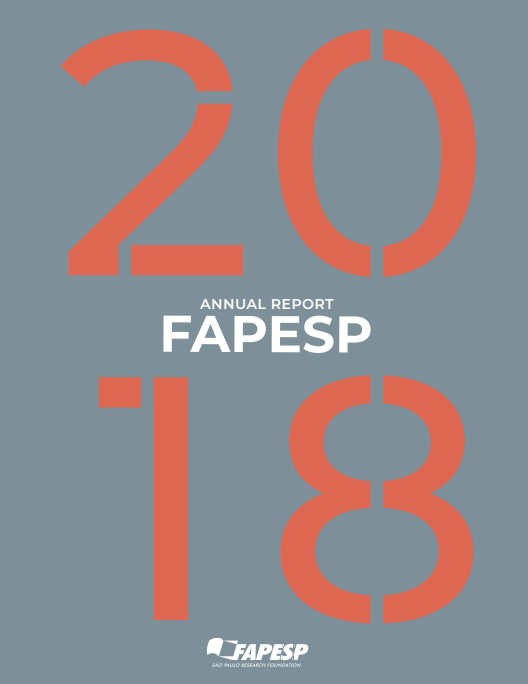The São Paulo Research Foundation is pleased to present this Report, which summarizes the activities of FAPESP in 2018 in continuing pursuit of its mission to promote the scientific and technological development of São Paulo State. 2018 was a year of significant political changes in Brazil, accompanied by changing expectations regarding the future of higher education, science and technology. In this setting, FAPESP maintained its strong presence characterized by stability, increased activity in the São Paulo State Science, Technology & Innovation (ST&I) System, and increasing visibility at home and abroad. In 2018, FAPESP disbursed $ PPP 599.4 million (in purchasing power parity exchange rate) to support 24,720 research projects, including grants and scholarships/fellowships, in all knowledge areas. It is important to note that ever since FAPESP’s inception, scientific advisors to FAPESP’s Scientific Directorate, comprising over 9,000 ad hoc reviewers, have subjected all awards to a rigorous merit assessment. These actions lead to the implementation of strategies approved by the Board of Trustees with respect to the Foundation’s mission: Training of Human Resources for Research, Basic and Applied Research, Research for Innovation, Strategic Research, Research Infrastructure and Communicating Science to the Public. These lines of action cover the entire knowledge chain relating to scientific and technological development, including basic research, applied research, and innovation, as well as the training of highly qualified human resources and the empowerment of companies established in São Paulo for research and development. FAPESP supports the human resources training for research through regular scholarships in Brazil and abroad range from scientific initiation to master’s, PhD, and postdoctoral research fellowships, as well as technical training fellowships. More ambitious long-term projects such as Thematic Projects and RIDCs, together with more short-term projects such as regular grants, promote knowledge advancement. The range of actions is completed by programs focusing on strategic issues and programs designed to support innovation. Programs focusing on strategic issues are proposed by the Foundation to the scientific community and include the FAPESP Bioenergy Research Program (BIOEN), the FAPESP Research Program on Global Climate Change (RPGCC) and the FAPESP Research Program on Biodiversity Characterization, Conservation, Restoration and Sustainable Use (BIOTA-FAPESP), among others. Regarding innovation, FAPESP organizes cooperative research projects with major corporations and directly supports innovative small business. The highlights of 2018 include the Phase 2 Young Investigator Grant call for proposals, whose remit was to consolidate research lines initiated by FAPESP Young Investigators grantees who had achieved excellence during the development of their projects. The year also saw the renewal, after an assessment conducted by an international committee, of the 17 Research, Innovation and Dissemination Centers (RIDCs) currently funded by the Foundation. In innovation and academia-business relations, the highlights were five new Engineering Research Centers (ERCs), four with Shell and one with EMBRAPA, as well as 270 projects approved under the Inovative Research in Small Business Program (PIPE). In 2018, the Foundation again worked to improve the quality of research conducted in São Paulo State, strongly encouraging international cooperation and hosting FAPESP Week meetings in Brussels, Liège and Louvain, Belgium, and in New York. Joint calls for proposals were also held with dozens of universities and funding agencies abroad. The latter included Germany’s Max Planck Society for the Advancement of Science (MPG) to support highly qualified young researchers interested in establishing research groups associated with universities or institutions in São Paulo State; this is an innovative model that promotes strong collaboration with researchers at MPG. The results achieved by FAPESP undoubtedly contributed to the growing visibility of science and technology produced in São Paulo, involving 871 media outlets in 60 different countries, as well as 13 million page-views using the Foundation’s online platforms. Pesquisa FAPESP magazine has become one of the most important instruments of science dissemination in Brazil. These accomplishments demonstrate FAPESP’s leading role in the international research funding arena and make it one of the most important agencies of its kind in Brazil. FAPESP Management: José Goldemberg (President – until September 7, 2018); Eduardo Moacyr Krieger (acting as President from September 8 to October 4, 2018); Marco Antonio Zago (President – beginning October 5, 2018); Carlos Henrique de Brito Cruz (Scientific Director); Carlos Américo Pacheco (Chief executive); Fernando Dias Menezes de Almeida (Administrative Director).
Autoria: FAPESP
Disponível no CM-FAPESP